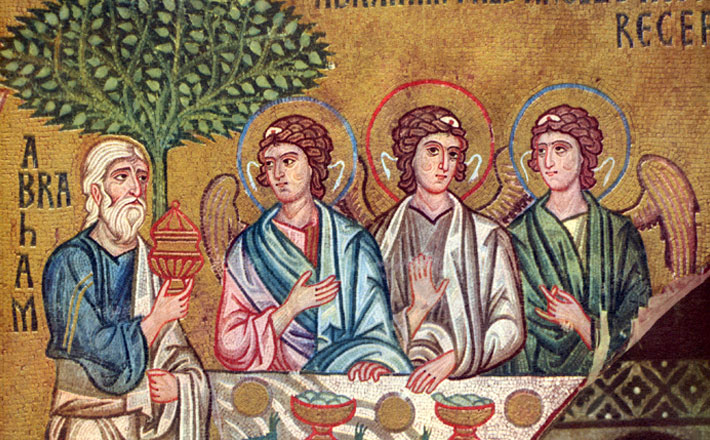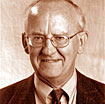Commentary on Psalm 15
Our question was, “How do we get into this place?”
A half-dozen of us were seeking entrance into a synagogue in the downtown area of a large German city. We had the address but could not find any building that looked like it might be a synagogue. Finally we saw a small black plaque that said “Israelite Community,” in Hebrew and in German. Alongside the plaque was a button. I pressed it. A buzzer sounded and a lock on the door clicked. We walked into the corridor and saw a young man sitting in a glass booth.
“Shalom,” he said. “Shalom” I answered. Then he asked some questions: “Where are you from? Can you show me your passports?” Then another buzzer, another door, and we walked into the very modern, very quiet, place of worship. A modern-day “entrance liturgy” of sorts, I thought. And I recalled this psalm.
The preacher for this Sunday may wish to deal with the Mary and Martha story in the assigned Gospel. If, however, the preacher isa Martha (or is married to a Martha, as is my own situation) she or he may wish to try something different. In that case I suggest reflecting on entrance liturgies, in the light of the psalm for the day, and then thinking also about exit strategies.
An Entrance Liturgy: Psalm 15
Psalm 15 functioned in ancient Israel as an entrance liturgy (there are other examples of entrance liturgies in Psalm 24:3-6 and Isaiah 33:14-16; in Micah 6:6-8 the prophet appears to be imitating such a liturgy). Imagine that you are a pilgrim coming to Jerusalem to worship at the temple. You couldn’t just walk right in to the temple area any more than we could have strolled right into that synagogue in Germany! There was a procedure to be followed and that’s where this psalm seems to have functioned.
Picture yourself arriving in the temple area. At the gate was a priest or a temple official. There were no buzzers or glassed-in booths, but there was an entrance procedure. The visitor, who may have come from a long distance on a pilgrimage to the Jerusalem temple, asked a pair of prescribed questions:
O Lord, who may abide in your tent?
Who may dwell on your holy hill? (Psalm 15:1)
Then the priest or temple official gave a response. The Hebrew uses participles to indicate continuing actions, rather than a single act:
Those walking blamelessly,
and doing what is right,
and speaking truth from their hearts (verse 2, my translation).
The “walking” word reaches back to the first psalm, “Happy are those who do not walk in the way of the wicked” (Psalm 1:1, my translation) and refers to the conduct of one’s entire life. “Doing what is right” again refers to one’s conduct in everyday events.
After these general words about actions, the psalm provides more specific instruction. The person about to go to worship God ought to reflect on his or her relationships to friends and neighbors. There should be no gossiping or slandering. The Hebrew verb translated as “slander” is from the root word meaning “foot;” the picture seems to be of someone who goes about on foot, from place to place, spreading gossip (verse 3).
Verses 4 and 5 provide further instruction about the desired lifestyle of those who are going to worship the Lord. Once again there is a general statement (verse 4a,b) followed by some specifics, in this case about keeping promises or oaths and on the handling of money. The point is clear: people who come to worship God on the Sabbath (or who arrive at the temple to worship on any day!) should not be exploiting their neighbors with exorbitant interest rates or with underhanded bribes on the other days of the week (verses 4c-5)!
The liturgy completed, we might expect the priest to say, “Shalom. Come in to worship!”
An Exit Strategy
The psalm text for today is concerned about getting into the place of worship. It is interesting to notice, however, that the concern of the psalm itself is not with what happens when one is inside the sanctuary – but with what happens when one is back in the world on the outside!
The psalm refers to lives that are blameless, lips that speak the truth, and feet that do not rush off to spread gossip. The psalm warns against oppressing the poor with unfair interest rates; I recently helped out a friend who had been tricked into a “payday loan” which was easy to obtain but difficult to pay back because of interest charges of 30 or 40 percent! The psalm also talks about breaking promises and not getting involved in bribery. Here is described, in other words, the sort of everyday life expected of God’s people when they are outside the sanctuary, out and about in their homes, shops, places of play and work.
Psalm 15 is an entrance liturgy. I suggest that we should balance it with an exit liturgy, or call it an exit strategy, when worshippers leave the house of worship to enter back into their everyday lives. We do in fact have such a liturgy. It runs, “Go in peace (shalom) — serve the Lord.” One pastor I know invites the congregation to exit with “Go in peace — remember the poor.”
We enter to worship, most often week by week. But then we exit to return to our callings to be God’s people in the world, seeking to live lives worthy of our callings, remembering the poor and as Genesis 18:1-10 reminds us, showing hospitality to the stranger. The writer of the letter to the Hebrews interprets this Genesis text, commending such hospitality. For in showing such, says the writer, “you may be entertaining angels without knowing it” (Hebrews 13:1-2).
Having entered to worship may we exit to serve, perhaps even to entertain angels unaware. “Go in peace, remember the poor.” There’s a fine exit strategy!


July 21, 2013